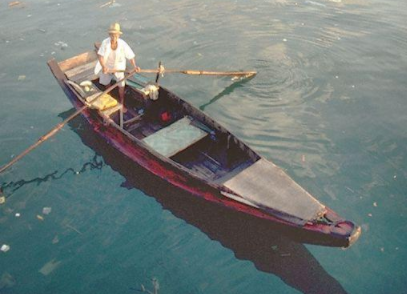A sampan is known in Singapore and the region as a small wooden boat powered by paddling or rowing.
[caption width="759" align="alignnone"] Source: NAS[/caption]
Source: NAS[/caption]
These boats were a common sight off the coast around Singapore in the past. In fact, right up till 1983, these boats were ubiquitous along the Singapore River.
The humble sampan has contributed much to Singapore’s development since Raffles' founding in 1819.
[caption width="647" align="alignnone"] Source: NAS[/caption]
Source: NAS[/caption]
[caption width="691" align="alignnone"] View of Boat Quay in 1900. Source: NAS[/caption]
View of Boat Quay in 1900. Source: NAS[/caption]
But where did the name "sampan" originate from?
"Sampan" is a common term in regional languages, including Malay and Indonesian. There is even an old Indonesian folk song called “Dayung Sampan” (literally translated as “Paddle Sampan”), whose tune was later adapted into Teresa Teng’s classic hit “Tian Mi Mi”.
Here is what Dayung Sampan sounds like:
Here is Teresa Teng's "Tian Mi Mi":
Singapore has also adapted Dayung Sampan into a National Song:
Isn't "sampan" a Malay or Indonesian word?
You will be forgiven if you think, at this point, that “sampan” has Malay or Indonesian origins (I certainly did), but it doesn’t.
The type of boats that would come to be known as sampans actually originated from China. These small boats were simply built and were known for their use of a flat plank to form the base and two planks for either side.
[caption width="800" align="alignnone"] Source: Wikipedia[/caption]
Source: Wikipedia[/caption]
“Sampan” is derived from the Chinese term “三板” (sān bǎn), which is means “three boards” or “three planks”, in reference to those Chinese boats.
The boats’ popularity grew over time, and according to Infopedia, much was written about the Chinese sampan in the 17th Century by Western travellers.
Over time, as a likely consequence of the interactions brought about by Chinese and European trade in the region, the word sampan entered Southeast Asian vocabularies.
“Sampan” also became the general term used to describe small wooden boats, which we often use today.
Top image adapted from NAS.
If you like what you read, follow us on Facebook and Twitter to get the latest updates.
If you like what you read, follow us on Facebook, Instagram, Twitter and Telegram to get the latest updates.
